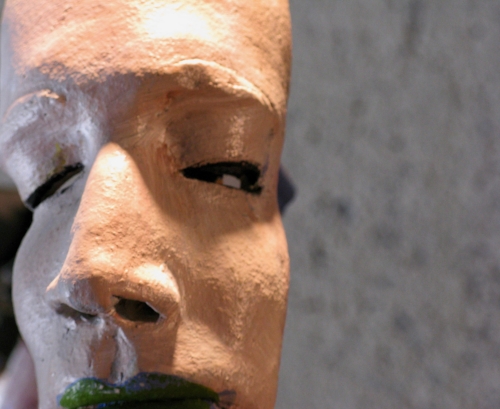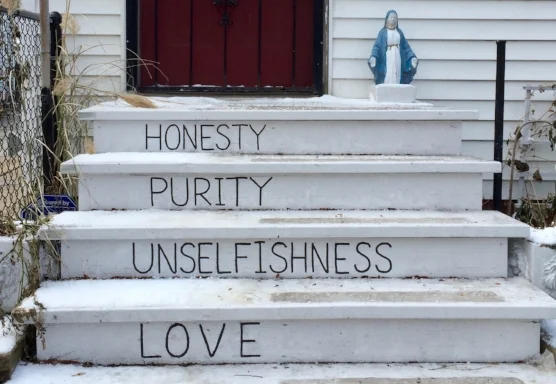Walking the Plumb Line
Excerpts from a sermon preached on July 15
Chapel of St. James the Fisherman, Wellfleet, MA
Speaking words that we might be tempted to negate, ignore or compromise, Amos – a farmer, a herdsman, and a dresser of sycamore trees – was called by God to afflict the rich, the powerful, and their chaplains with the razor-sharp plumb line of divine judgment.
During Amos’ lifetime, the economic elite was the ruling class. Comprising less than 3 percent of the population, they owned most of the land and controlled the vast majority of the wealth. They also possessed a body of cultural information so different from that of the peasantry, resulting in two distinct subcultures within the same society.
Through excessive land rent, unfair trade practices, exorbitant taxes, and violent control, the ruling class of Amos’ society literally waged war against the poor, and the religious leadership justified their behavior. Thus, Amos spoke vehemently to the rich and powerful, and to their clergy, cursing the establishment’s abandonment of the poor and needy and their betrayal of the outcast and oppressed.
Some 200 years later, John the Baptist, following in the footsteps of Amos and the Hebrew prophetic tradition, came forward to preach an equally radical, prophetic pronouncement against the rich and powerful. In particular, John condemned Herod, an ambitious and wealthy man who served as the chief political authority of Galilee during the time of Jesus. More interested in his own agenda than the emperor’s, and thumbing his nose at Israel’s religious laws, Herod was disliked by his Roman masters and hated by his Jewish subjects.
Although Herod had imprisoned John, scripture tells that he both “feared” this prophet and “liked to listen to him.” However, pride and arrogance eventually got the best of the governor; and at a birthday party, Herod delivered John's head on a platter to his seductive stepdaughter. Though the prophet was silenced, his prophetic imagination was not. For when Herod heard of Jesus, he said, “John, whom I beheaded, has been raised.”
Both Amos and John the Baptist remind me of the many courageous women and men who have stood up, sat down, or taken a knee in the presence of power and authority, and have said “No more.” No more guns, war, or police violence; no more border walls, detention centers, workplace raids, or separation of families; no more poverty, injustice, or political deceit; no more dictators, tyrants or demagogues; and in the words of former presiding Episcopal bishop Edmond L. Browning, “no more outcasts.”
Although the prophets are often ignored, discounted, jailed and even killed in order that they may be silenced, their voices, words and messages are raised again and again. Even defenseless, unarmed, decapitated, dead men and women like Amos, John the Baptist, Jesus and their followers down through the ages come back to haunt the powerful of this world. Thus, the famous Civil War hymn sings, God’s "truth is marching on.”
Pondering the words of Amos and John, I couldn’t help but wonder: What would they have to say today?
- What would they say to the gun lobby and legislators who are beholden to the NRA?
- What words would they speak to the Secretary of Education about protecting the rights, ensuring the safety and providing a quality education for all our children?
- What would they say to the presidents of North and South Korea?
- What would they proclaim to the leaders of Israel and Palestine, and their supporters around the world?
- How would the prophets respond to the dismantling of our nation’s environmental protection laws?
- What might they declare to our President and Congress as they grapple with immigration reform and border security?
- What would they say about the state of America’s inner cities and urban neighborhoods?
- What would they say to our nation’s farmers and food producers?
- What wisdom would they offer the members of the Supreme Court as they wrestle with questions of choice, civil rights, and religious freedom?
- What would these prophets say to the faith community as we witness what’s happening to the most vulnerable in our nation and world?
I think the answer is clear. In the words of Micah, the prophets call us to “do justice, love kindness and walk humbly with God.” How we carry out this mandate – that’s where it gets complicated – in both ancient and modern times. And that’s where civil debate, discourse, protest, politics, journalism and action all come together to create a just and civil society.
In these troubling times, we need to heed the voices of the prophets, both those from the past and those in our midst. We need to allow their words to provoke and challenge us, washing over us like a waterfall, blowing over us like the rush of wind. And then we need to act.
I’m grateful the General Convention of the Episcopal Church seemed to hear and heed the voices of the prophets this past week as deputies and bishops wrestled with climate change, immigration reform, marriage equality, transgender rights, sexual misconduct, peace and justice in the Holy Land, gun violence, racial reconciliation, and evangelism. I do believe that Presiding Bishop Michael Curry’s call for the Episcopal Church to be fully engaged in the Jesus movement has taken hold.
Realizing that, “The arc of the moral universe is long, but it bends toward justice” (Dr. Martin Luther King, Jr.), I ask you: What’s one step you can take this week, however small, to bend that arc a little bit?
May we be able to bear words of truth, no matter how disconcerting, frightening, or offensive they may be, and may we walk their plumb line as we respond to the real challenges and opportunities set before us.
- Tracey



